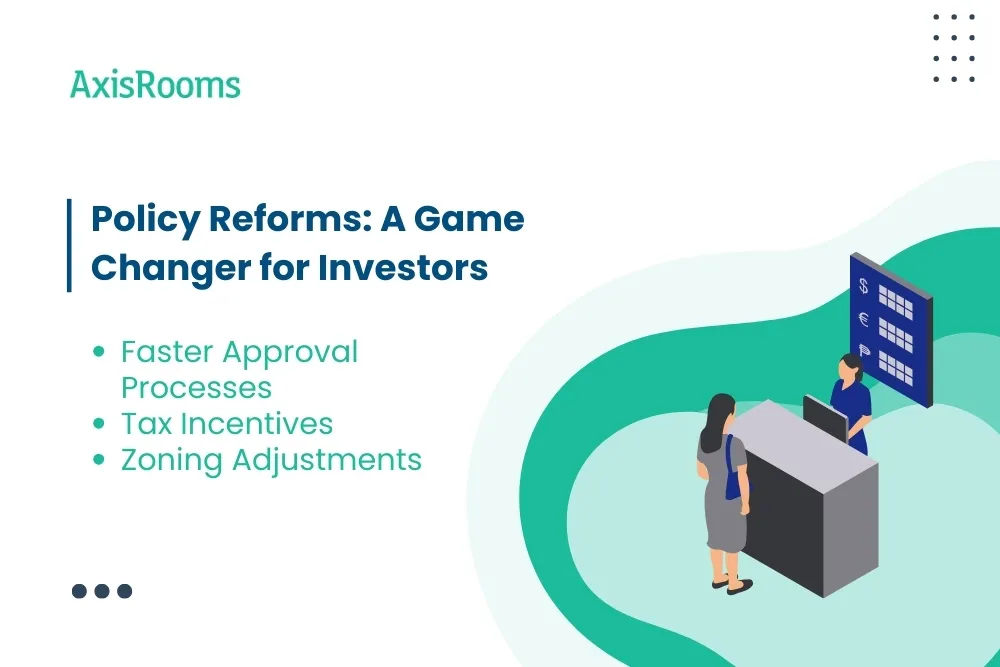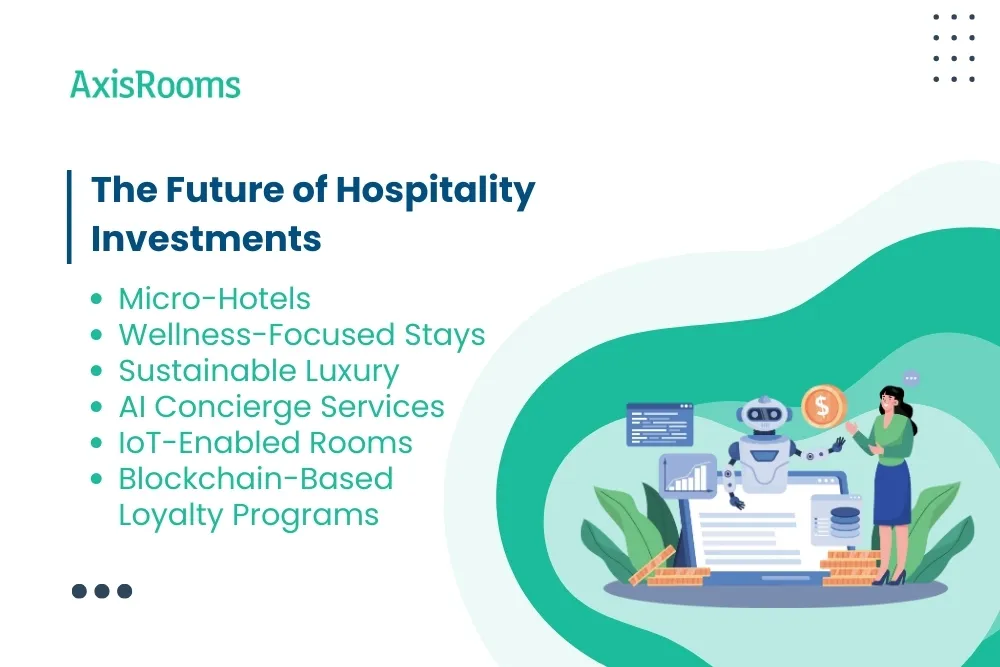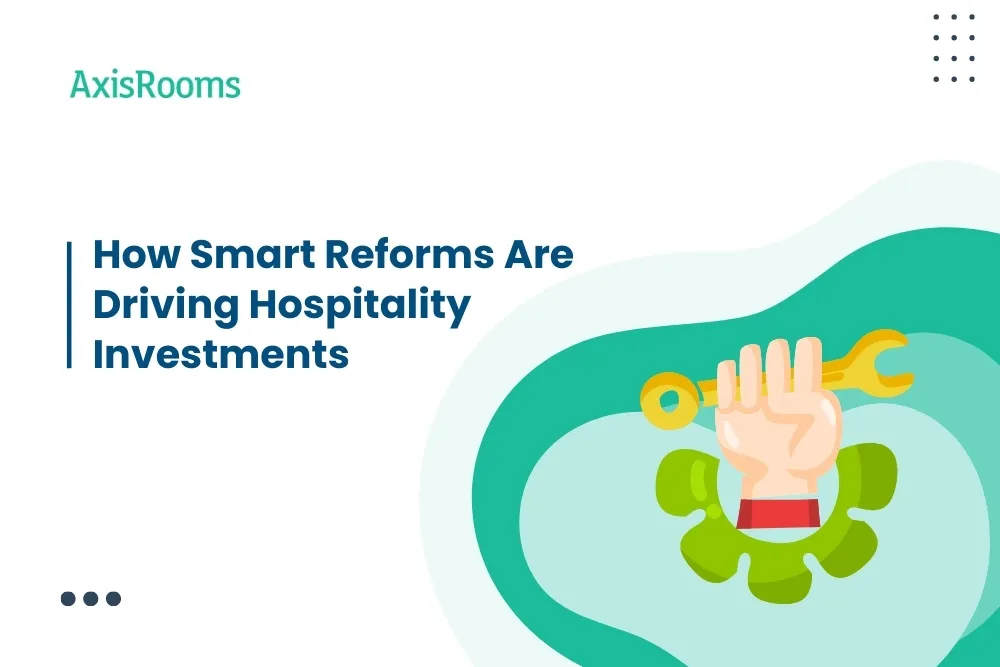The hotel industry has become a prime destination for investors, thanks to evolving regulations and market trends. Let’s explore why hospitality investments are thriving and how new policies are shaping the sector.
The Hospitality Sector is More Than Just Recovering
The COVID-19 pandemic once threatened the survival of the hotel industry, but it has not only recovered—it is flourishing. In 2025, we are seeing a significant shift in investment patterns, with increased focus on hotels, resorts, and related assets. What is driving this growth? Let’s examine the key factors.
Market Insights
- Global hotel investment reached $67.2 billion in 2024, reflecting a 15% increase from the previous year.
- Experts predict U.S. hotel revenue per available room (RevPAR) will grow by 3.8% in 2025.
How Smart Reforms Are Driving Hospitality Investments
Understanding Hospitality Investments
Hospitality investments go beyond simply funding a hotel and hoping for returns. The sector includes:
- Hotels – Ranging from budget to luxury.
- Resorts – Including beach, ski, and wellness destinations.
- Event spaces – Catering to meetings, conferences, and celebrations.
- Restaurants – Enhancing guest experiences through fine dining.
Key Investment Drivers in 2025
- Technology Integration – Smart rooms, AI-powered front desks, and virtual reality (VR) tours are becoming standard.
- Sustainability – Investors are prioritizing eco-friendly designs and hotel operations.
- Experience-Driven Travel – Modern travelers seek unique, memorable experiences beyond accommodation.
Policy Reforms: A Game Changer for Investors
Governments worldwide recognize the hospitality sector’s economic potential and are introducing investor-friendly policies.

Notable Reforms
- Faster Approval Processes – Streamlined regulatory approvals are reducing bureaucratic delays.
- Tax Incentives – Governments are offering tax benefits to attract hospitality investors.
- Zoning Adjustments – City planners are allowing hotels in previously restricted areas.
The Role of Effective Hotel Management
A well-managed hotel is essential for profitability. Investors in 2025 are focusing on strategies that enhance efficiency and guest satisfaction.
Key Strategies for Success
- Data-Driven Decision Making – AI is being used to forecast occupancy and optimize pricing.
- Personalized Guest Experiences – Leveraging data to tailor stays for visitors.
- Operational Efficiency – Smart technology is helping reduce labor costs while maintaining high service standards.
Spotlight on AxisRooms: Revolutionizing Revenue Management
- Dynamic Pricing – Machine learning adjusts rates based on market trends and competitor analysis.
- Demand Forecasting – Predicts occupancy with high accuracy, helping hotels plan ahead.
- Channel Management – Ensures optimal rate distribution across multiple online travel agencies (OTAs) and direct booking platforms.
For hospitality investors, such tools are no longer optional—they are essential for success in an increasingly competitive market.
Hotels as Experience Hubs: Beyond Traditional Stays
In 2025, leading hotels are not just offering rooms; they are curating experiences to attract guests.
How Hotels Are Enhancing Their Offerings
- Innovative Event Planning – Integrating AR-enhanced conferences and hybrid virtual-physical gatherings.
- Tourism Partnerships – Collaborating with local attractions to create exclusive travel packages.
- Food & Beverage Innovation – Transforming hotel restaurants into popular destinations for both guests and locals.
The Future of Hospitality Investments
Looking ahead, key trends will continue to shape the industry.

Emerging Trends
- Micro-Hotels – Compact, technology-driven accommodations for minimalist travelers.
- Wellness-Focused Stays – Hotels incorporating health and wellness services.
- Sustainable Luxury – A growing preference for eco-friendly high-end accommodations.
Technology’s Expanding Role
- AI Concierge Services – Offering personalized recommendations and seamless assistance.
- IoT-Enabled Rooms – Smart rooms that adapt to guest preferences.
- Blockchain-Based Loyalty Programs – Secure, transparent reward systems for frequent travelers.
Conclusion: Why 2025 is an Ideal Time for Hotel Investments
To summarize:
The hospitality industry is experiencing strong growth and investor confidence.
- The post-pandemic recovery has fueled significant investment in the hospitality sector, leading to increased occupancy rates and higher revenue potential. Travelers are returning in large numbers, driving demand for diverse accommodation options, from budget hotels to luxury resorts.
Government policies are making hotel investments more attractive.
- Many countries are introducing investor-friendly policies, such as tax incentives and faster approval processes, to encourage hotel development. Zoning laws are being modified to allow new hospitality projects in prime locations, ensuring better returns for investors.
Effective management and technology adoption are key to profitability.
- Hotels that leverage data-driven decision-making, AI-based revenue management, and personalized guest experiences are proving to be the most successful. Smart automation and operational efficiency are helping businesses cut costs while maintaining high service standards.
Future success depends on innovation, guest experiences, and sustainability.
- Travelers today prioritize unique experiences, sustainable practices, and seamless digital interactions. Hotels that incorporate eco-friendly initiatives, advanced technology, and experiential travel options will lead the market in 2025 and beyond.
For those considering hospitality investments, 2025 presents a prime opportunity. With evolving consumer preferences and supportive policies, the industry is poised for long-term success. Investing in hotels today means shaping the future of travel.


